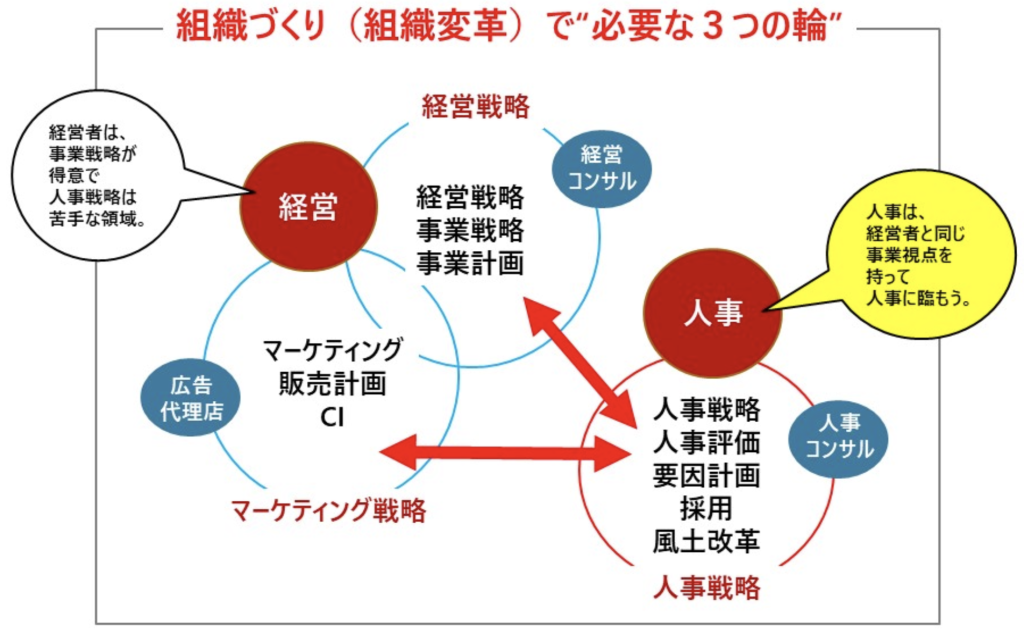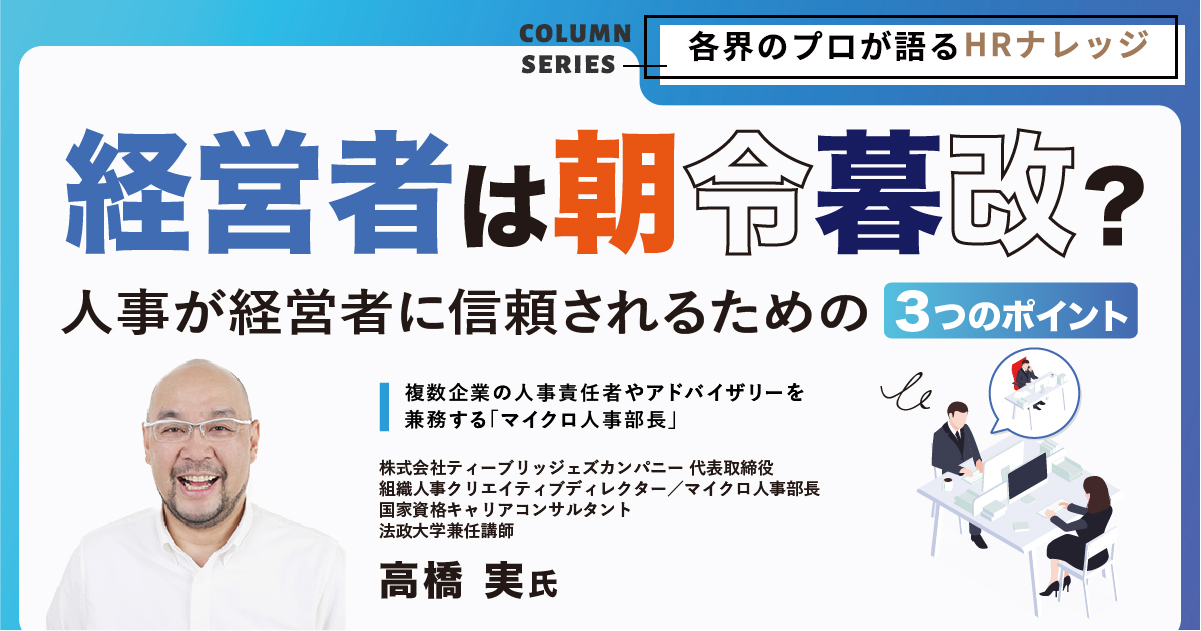"We will increase the number of new graduates hired by 30 this year, so make sure that we have enough new graduates."
「来期までに営業の優秀なマネージャー候補の採用してくれ」
"The personnel system is outdated, so I would like to revise the system in the next fiscal year."
There are many HR people who have experienced being called by management and suddenly being confused by instructions on such personnel issues. Then, why do such instructions like "Morning Ordinance and Settlement Renovation" come from management?
Managers are always thinking about the company
Obviously, managers are always thinking about the company. We also have information that does not reach you or your employees in HR. Managers always take a "management perspective" and spend time constantly thinking about "how we should make a good company" not only in terms of work time but also in private life. Managers spend far more time thinking about the company than HR in the field thinks.
Sudden instructions from management may seem like a morning change from the perspective of personnel in the field. However, it is the result of managers spending a lot of time thinking and making decisions from various management perspectives. However, it is quite difficult to share the thinking process of managers who have been doing it over time, and it is easy to lead to gaps.
Managers understand that HR is a shirot
The most important job of a manager is to "grow the business". This is because if the business does not grow and maintain, the organization will not be viable. For this reason, most managers place importance on the business perspective first.
Originally, HR work is a job that managers should do. However, start-up companies need speed and results of business growth. As a result, there is inevitably a lot of time spent working closer to business, and HR work tends to take a back seat. Managers do not have time to systematically learn HR knowledge. In other words, management is the "shiroto of human resources." That's why I want to delegate authority to HR personnel "as a management spokesperson."
From the perspective of an HR professional, it may sometimes feel like the management is throwing away all of their ideas. However, managers do not have time to talk about their thought processes or put them into action. You may have a shallow knowledge of HR and may not be sure if what you think is correct. That is why HR personnel are required to have the ability to chew on the will of management, think for themselves, and carry out their own as HR professionals. This is the role that HR personnel need to play as a spokesperson for management.
In an organization, "organizational growth pain" occurs as business grows.
In the process of business growth, the scale of the company grows larger and larger, and the number of employees also increases. The state of the organization will also change rapidly. We must take timely measures from time to time.
In an organization that grows, an event that can be said to be "organizational growth pain" inevitably occurs. It is fine if it is a positive event, but the number of retirees and mentally ill employees will increase, discord in internal communication will occur, and many negative events will occur. If we leave these events alone, they can lead to even bigger problems.
If a problem develops, it will take a lot of time and effort to solve it, which may drag down business growth. HR personnel are required to quickly detect such "organizational growth pain" and implement solutions in a timely manner.
Necessary for organization building“Three wheels”
However, there are so many companies that cannot solve problems as they would like. Many companies tend to focus on "coping therapy."
For example, the number of retirees increases, and although we rush to recruit mid-career recruits, we build recruitment requirements by specializing in "the work content of vacant positions", and we bring in employees who have a low degree of matching vision and corporate culture. As a result, employees do not stay in place, which leads to an increase in the number of retirees, the corporate culture collapses, the retention rate of employees does not increase, and HR personnel are increasingly busy with short-term recruitment work. There are so many companies that do not pay attention to the essential issues and fall into a "negative loop" by continuing coping therapy.
In organizational development and organizational transformation, it is necessary to have a perspective of "three "circles": management strategy", "marketing strategy", and"personnel strategy". With these three perspectives in mind, it is necessary to draw up a grand design for organizational development rather than coping therapy.
As mentioned above, the managers of many companies are "personnel shiroto". Inevitably, "HR strategy" is left behind, and there are many cases where the three wheels of organizational building do not align and do not go well.

It is the role of HR personnel to put together the piece of "HR strategy" of organizational development. In order for each of the three wheels to function, HR personnel should also have a firm understanding of "management strategy" and "marketing strategy" and confront management.
"Three points" for HR to gain trust from management
The job of a human resources manager plays a very important role, but in order to promote the smooth creation of an organization, it is important to deepen the trust of management.
The three points necessary for this purpose are as follows.
Organizational development leads to great results when management and personnel personnel work together with a strong relationship of trust. HR personnel should be able to grow greatly in the organization and themselves by understanding the management and working from the perspective of the manager.
Today's Point
・The manager is "HR Shirouto". In the HR area, HR personnel should demonstrate their professionalism
・The three wheels necessary for organizational development are "business strategy", "marketing strategy" and "personnel strategy" are indispensable
・It is important for HR personnel to always build a strong relationship of trust with management.

 Consult and make a reservation
Consult and make a reservation Add LINE Friends
Add LINE Friends 080-1001-4675
080-1001-4675



 Receive on FaceBook
Receive on FaceBook Receive on LINE
Receive on LINE
